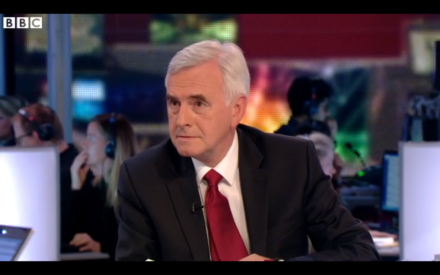
In the run up to the 2010 general election, George Osborne predicted that the markets would turn on British government debt, forcing up interest rates until the economy could no longer afford to make the payments. He predicted that the country would face a sterling crisis, and the economy would go to the wall.
He was wrong. Yields – the interest rates on government bonds – stayed at an all time low right up to the election, even when no-one knew which party would win.
However, Osborne’s prediction now appears to be coming true for a very different reason, the markets’ response to Brexit policy and its uncertainty. A graph published this week show the yield on UK debt was steady in 2016 until the referendum in June, at which point the Bank of England launched a new tranche of quantitative easing, where they “print money” as a way of forcing down yields. The graph shows the yield fell to 0.6 per cent, but then it started to climb again, steeply, as the market fought back. Currently it is 1.4 per cent, in spite of the efforts of Bank of England.
It is still too early to say whether this is a major problem, but it is a time to start worrying. Control of interest rates is the single most powerful economic tool at the disposal of the British government. But markets are far more powerful when they lose confidence in a government.
What will chancellor Philip Hammond do if interest rates rise to unsustainable levels? This should be the question asked by John McDonnell, his shadow. Hammond has enough on his plate but would he sing in the bath as his predecessor Norman Lamont was said to have done in the aftermath of Black Wednesday? It seems unlikely, given that Hammond is currently at the centre of Government tensions, and subject to negative briefing by Cabinet ministers, who want quick details of what looks like an increasingly hard Brexit.
Anyway, regardless of the morale of Hammond, what is clear is that since 2010 government debt has doubled. If interest rates continue to shoot up and then stay up, it won’t be long before the debt is doubled again, and then again. It would be a genuine economic crisis, entirely self-inflicted by the policy of Brexit.
The talk of Hammond wanting to resign as chancellor may well have stemmed from concerns of this type. Hammond is probably looking at the rising yields with concern for his own reputation and place in history were the situation to get out of control. The story about Lamont singing in the bath following Britain’s departure from the exchange rate mechanism prompted ridicule because he had continued to do the job without ever voicing his fears, even as the crisis engulfed him. Perhaps Hammond is mindful of this.
If yields continue to rise, then the only response would be for the May Government to abandon their Brexit policy, or for the Bank of England to fight the markets. They would do this with further quantitative easing, but on a massive, massive scale.
However, in her conference speech, Theresa May made the ending of quantitative easing the centrepiece of her economic policy. She impressed upon us her great knowledge of economics, by addressing the issues with authority. This places her in a difficult position. Either abandon Brexit or abandon her stance against QE. Obviously her sceptical attitude towards QE is less significant, but it would be a wise for Labour figures to be ready to pounce on any u-turn, as well as to quiz Mark Carney, the Governor of the Bank of England, on whether he has been required by the prime minister to start and stop his post-referendum tranche of QE.
To be clear, no-one wishes this situation to get out of control, for the sake of the country. But to see the incompetence of this Government slowly unfolding in such a catastrophic manner would provide – in fact, demand – space for Labour to respond, The role of the Opposition is to press for the Government to do the right thing for the country, rather than covering things up for the sake of the reputation of their ministers. We allowed David Cameron to get away with incompetence for too long. Let’s not allow May and Hammond to get away with it also.




More from LabourList
The cost of living crisis is still Britain’s defining political challenge
‘Nurses are finally getting the recognition they deserve’
Letters to the Editor – week ending 15th February 2026